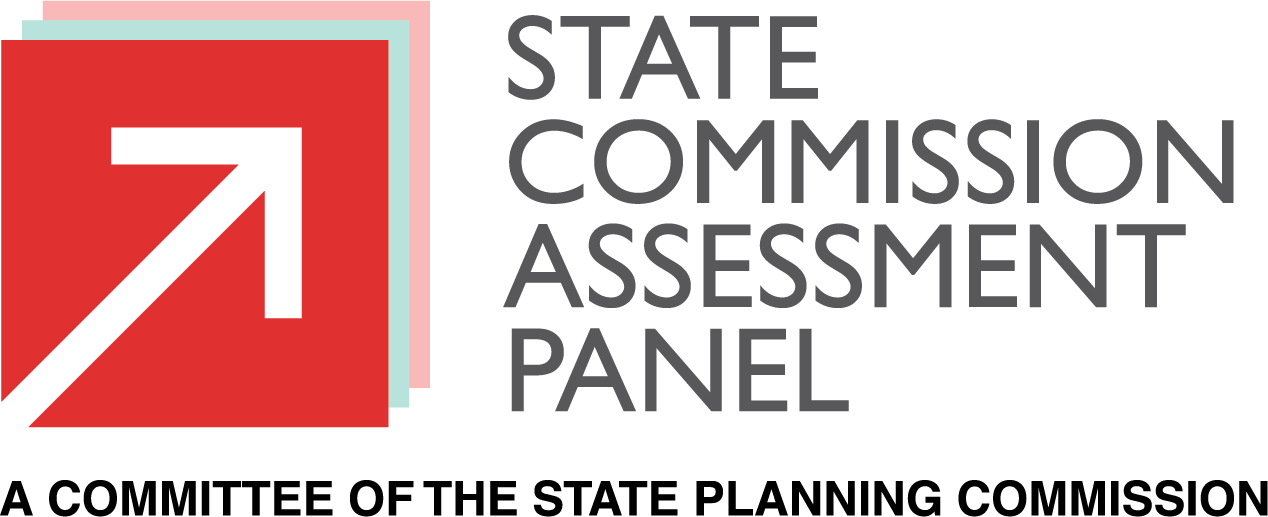SCAP hearings
Regular hearings of the State Commission Assessment Panel (SCAP) will be held on the second and fourth Wednesday of each month. Alterations to the scheduled hearing arrangements may occur from time to time according to workload. A current schedule is available on the meetings and agendas page.
Hearings will generally be held in the morning. Attendees will be notified of the time of hearings in advance.
Hearings will ordinarily be held in the Level 9 Inparri Kuu Seminar Room at 83 Pirie Street, Adelaide, unless otherwise notified by the SCAP Secretariat. Meetings at other locations, may be convened from time to time to meet specific statutory or operational needs. All SCAP hearings are open to the public with deliberations held in private.
Agendas and minutes
Agenda items (excluding legal opinion and commercially confidential information, and recommendations relating to Crown Development or mining proposals) are made available to the public, including applicants and representors, from the Wednesday preceding the scheduled meeting at the agendas and minutes section of this website.
Minutes of the SCAP hearings are published on this website within the business day following the hearing.
Operating directions and Code of Conduct
The SCAP Practice and Operating Directions outline how the business of SCAP is conducted and are determined by the Commission in accordance with section 29(3)(a) of the Act.
Members of the SCAP are bound by the Minister's Code of Conduct which forms part of the SCAP Practice and Operating Directions.
Hearings and representations
Applicants
For applications to be determined by the SCAP, applicants are provided the opportunity to attend the meeting, even when there are no representors to be heard.
Representors
Representors who have expressed a desire to be heard by the SCAP will be heard in accordance with the Act.
Concurrence items
For requests by councils for concurrence, the SCAP only considers the written advice and documentation provided by the council. As the council has made its decision, neither the applicant nor representors (who may already have exercised their right to attend a Development Assessment Panel meeting) are invited to ensure procedural fairness in the SCAP’s deliberations.
General
The Presiding Member will allow any member of the SCAP to ask relevant questions of any person appearing before it, and may refuse to allow any questions, comment or debate that is in his/her opinion not relevant to the subject matter.
The SCAP Secretariat can provide a Microsoft Teams link for attendees where required.
The SCAP discusses and determines applications in private after applicants, representors, council and agencies have left the meeting.
Hearing protocols
Subject to attendance numbers, members of the public and media are welcome to attend the SCAP in-person to observe development assessment applications being heard. Attendance via MS Teams will be offered if room capacity has been reached. To attend a SCAP hearing all attendees must register with the SCAP Secretariat no later than 3:00pm the Monday prior to the scheduled hearing date, via DHUD.SCAPSecretary@sa.gov.au.
Attendees will follow the direction of the Presiding Member and are expected to adhere to the following general meeting protocols:
- enter the meeting room quietly at the beginning of the agenda item
- quietly proceed to the public gallery seating as directed by the SCAP Secretariat
- turn off mobile phones and any other electronic device (i.e. laptops and tablets)
- cameras and video equipment are not permitted in the meeting room as recording SCAP hearings is not permitted
- refrain from talking and eating during the hearing
- to limit disruptions, late attendees will not be permitted to enter the meeting room if they arrive more than 5 minutes after the scheduled commencement time of the agenda item
SCAP staff
While independent of the Government, SCAP is supported in its role by the Planning and Land Use Services division of the Department for Housing and Urban Development. Staff provide professional research and advice to the SCAP regarding applications and other matters. The SCAP is also able to delegate extensive administrative and decision-making responsibility to certain planning officers of the Department.
